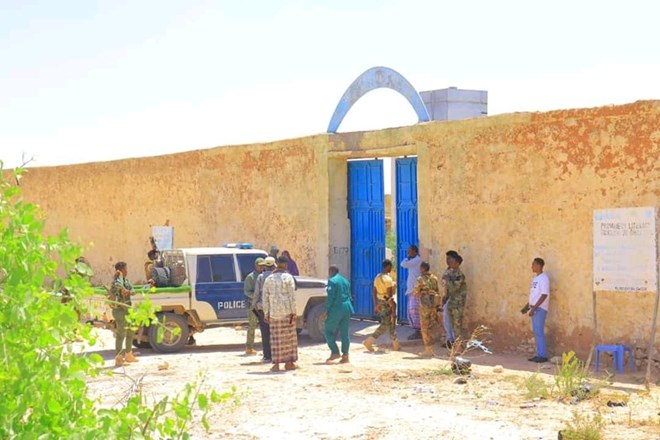Facebook Twitter (X) Instagram Somali Magazine - People's Magazine
In a dramatic escalation of clan-related violence in Somalia’s Mudug region, armed clan militiamen stormed the central prison in Galkayo on Friday morning, targeting the Puntland-administered section of the facility. The assault aimed to free inmates sentenced to death, further highlighting the persistent security challenges in the region.
The attack, which resulted in a brief but intense clash with correctional officers, left one person dead. It remains unclear whether the militia successfully freed the targeted inmates, as Puntland authorities have yet to issue an official statement regarding the current status of the prison and the fate of the inmates involved.
According to sources familiar with the incident, the attack was likely an attempt to liberate individuals recently sentenced to death by the Puntland Supreme Court for the murder of prominent businessman Ahmed Tahliil. His death had sparked widespread attention in the region, and the court’s decision to impose capital punishment and lengthy prison terms has remained a focal point of local tensions.
The Mudug region, where Galkayo lies, has long been a hotspot for clan conflicts and political instability. Straddling the border between Puntland and Galmudug, the area has witnessed frequent clashes driven by historical clan rivalries and struggles for territorial influence. Analysts emphasize that the recent prison raid is symptomatic of broader issues within Somalia’s justice and security framework, particularly in regions where state control remains fragile.
The latest incident also raises renewed concerns over the security infrastructure of Galkayo’s central prison. The facility has faced criticism in the past for its vulnerability to violent breakouts, including a significant jailbreak in 2024 when several militants managed to escape custody. Though there is no evidence indicating the involvement of extremist groups such as Al-Shabaab in this latest attack, the breach underscores ongoing weaknesses in Puntland’s detention and correctional systems.
Efforts to strengthen prison security in the region have often been hampered by limited resources and the complexities of clan-based affiliations within security forces. Many local prisons lack modern surveillance systems, sufficient personnel training, and the infrastructural fortifications necessary to prevent such assaults.
This raid also highlights the ongoing challenges Somalia faces in implementing effective judicial rulings amid clan loyalties that frequently undermine law enforcement efforts. Local elders and power brokers often exert significant influence over the handling of criminal cases, making it difficult for the formal justice system to operate independently.
The Puntland authorities’ silence following the attack has only fueled speculation and concern among local communities. Residents fear retaliatory violence between clans could erupt if the assailants remain unpunished or if the imprisoned individuals were indeed released.
As the region continues to grapple with such security lapses, calls for increased collaboration between Puntland and federal Somali security forces have grown louder. Addressing the root causes of clan violence while ensuring accountability for serious crimes like the murder of Ahmed Tahliil remains a critical step toward lasting stability.

